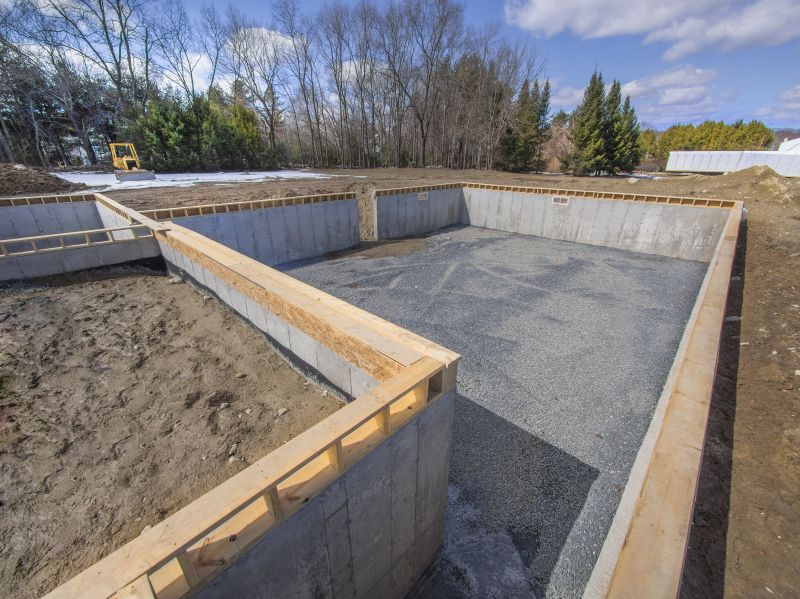Expert Picks For Essential Concrete Foundation Service Products
Find the most trusted tools and materials used by industry experts to achieve precise and long-lasting concrete foundations.
 When undertaking a concrete foundation service, selecting the appropriate products is essential to ensure a durable and stable structure. These products range from various forms of reinforcing materials to specialized tools designed to facilitate precise installation. Understanding the different types of products available can help contractors and DIY enthusiasts make informed decisions tailored to their specific project needs. From foundational supports to curing agents, each product plays a vital role in the overall success of a concrete foundation.
When undertaking a concrete foundation service, selecting the appropriate products is essential to ensure a durable and stable structure. These products range from various forms of reinforcing materials to specialized tools designed to facilitate precise installation. Understanding the different types of products available can help contractors and DIY enthusiasts make informed decisions tailored to their specific project needs. From foundational supports to curing agents, each product plays a vital role in the overall success of a concrete foundation.
Top Overall Option
Concrete Reinforcement Mesh
Concrete reinforcement mesh provides a versatile and effective way to strengthen foundations by distributing loads evenly and minimizing cracking. It is suitable for a wide range of foundation types and can be easily incorporated into various construction projects. When combined with proper placement and curing, reinforcement mesh helps promote long-term stability and durability of the concrete structure.
Types of Products For Concrete Foundation Service
Reinforcement Rebar
Steel bars used to reinforce concrete, providing tensile strength and structural support.
Wire Mesh
Grid-like steel mesh that helps distribute loads and control cracking in concrete slabs.
Formwork Systems
Reusable or one-time-use molds that shape and support concrete until it hardens.
Concrete Mix
Pre-mixed or custom-blended concrete designed for foundational applications.
Vibrators
Tools used to eliminate air pockets and ensure proper compaction of poured concrete.
Curing Compounds
Products applied to concrete to retain moisture and promote proper curing.
Leveling Tools
Devices such as laser levels and screeds used to achieve a flat and even foundation surface.
Sealants and Waterstops
Materials used to prevent water ingress and seal joints in concrete structures.
Anchor Bolts
Fasteners embedded in concrete to secure structural elements or equipment.
Expansion Joints
Components that allow for movement and reduce stress within concrete slabs.
Form Ties
Supports that hold formwork panels together during concrete pouring.
Concrete Admixtures
Additives that modify properties of concrete, such as setting time and workability.
Shovels and Trowels
Hand tools essential for finishing and smoothing concrete surfaces.
Safety Equipment
Protective gear including gloves, goggles, and masks for safe handling of concrete products.
Popular Choices
Widely used for concrete reinforcement, offering tensile strength and stability.
Commonly selected for slab reinforcement to help control cracking.
Popular for its ease of use and availability in various mix designs.
Frequently used to ensure proper compaction of poured concrete.
Essential for shaping and supporting concrete during setting.
Commonly applied to improve concrete curing and strength development.
Popular for achieving level and flat foundation surfaces.
Selected for preventing water ingress and sealing joints.
Frequently used to secure structural components to foundations.
Often incorporated to accommodate movement and prevent cracking.
Commonly chosen for maintaining formwork integrity during pours.
Popular for customizing concrete properties for specific conditions.
Essential tools for finishing concrete surfaces efficiently.
Always recommended for safe handling and application of foundation products.
Proper preparation and material selection can significantly influence the longevity of the foundation. Reinforcement products such as rebar and wire mesh provide structural integrity, while formwork systems help shape the concrete during pouring. Additionally, curing compounds and sealants contribute to the concrete's strength and resistance over time. It is important to consider the compatibility of these products with the project scope, environmental conditions, and load requirements.
Quality tools and accessories, including vibrators, levelers, and measurement devices, assist in achieving precise placement and finishing. Investing in reliable products ensures not only the integrity of the foundation but also efficiency during construction. As the foundation is the cornerstone of any structure, selecting products that meet industry standards and specifications is crucial for safety and performance. Being aware of the variety of available options allows for better planning and execution of foundation-related tasks.
Key Buying Considerations
- Compatibility with project scope and specific foundation requirements.
- Material durability and resistance to environmental factors.
- Ease of installation and handling for both professionals and DIY users.
- Compliance with industry standards and safety regulations.
- Availability of the product and supplier support.
- Cost-effectiveness relative to project budget and longevity.
- Product specifications such as load capacity and tensile strength.
- Compatibility with other materials used in the foundation process.
- Ease of sourcing replacement parts or additional units if needed.
- Recommendations for specific environmental conditions like moisture or temperature.
- User reviews and feedback for real-world performance insights.
- Warranty or guarantee offered by the manufacturer.
- Compatibility with tools and equipment you already own.
- Environmental safety and toxicity considerations, if relevant.
- Potential for reuse or recycling after project completion.
